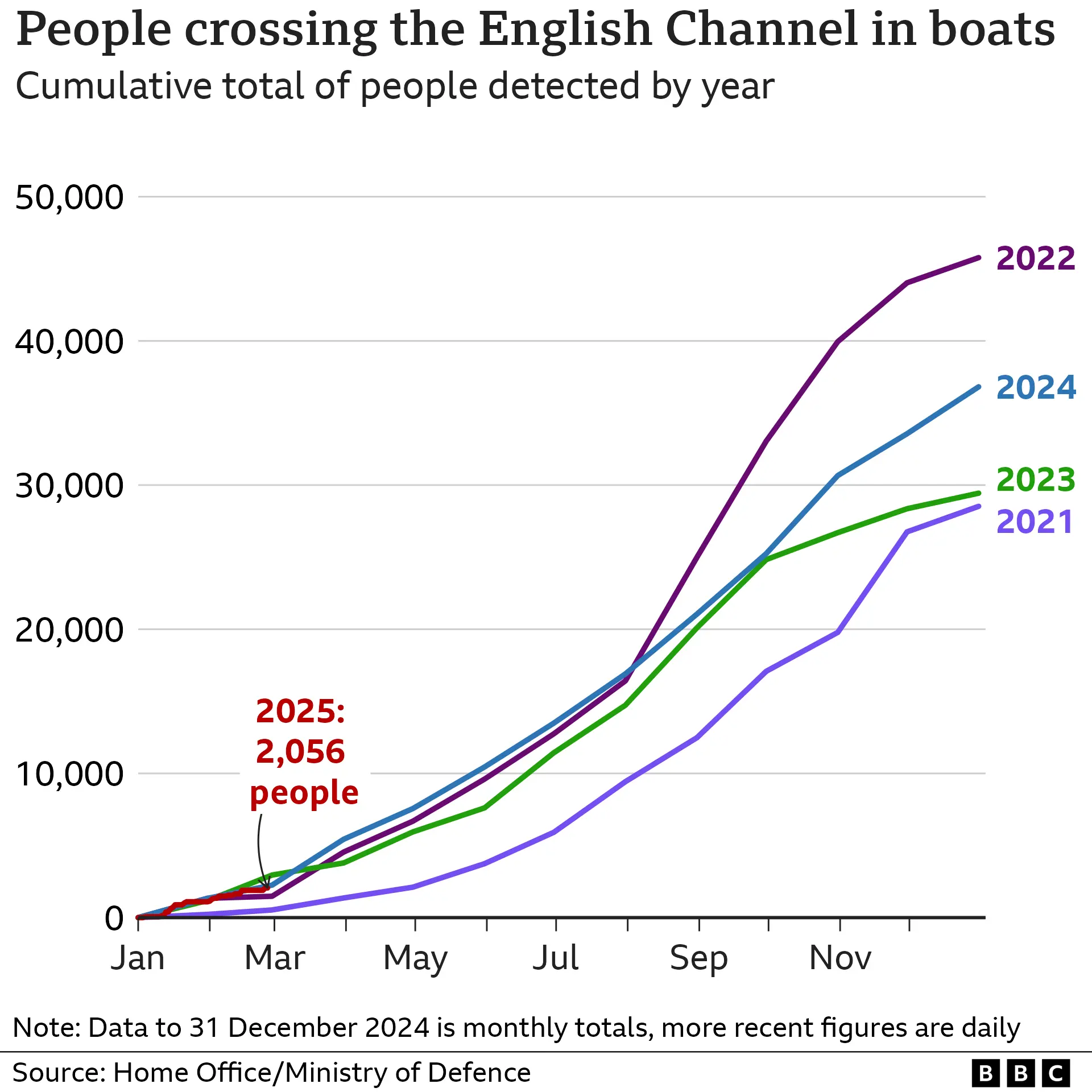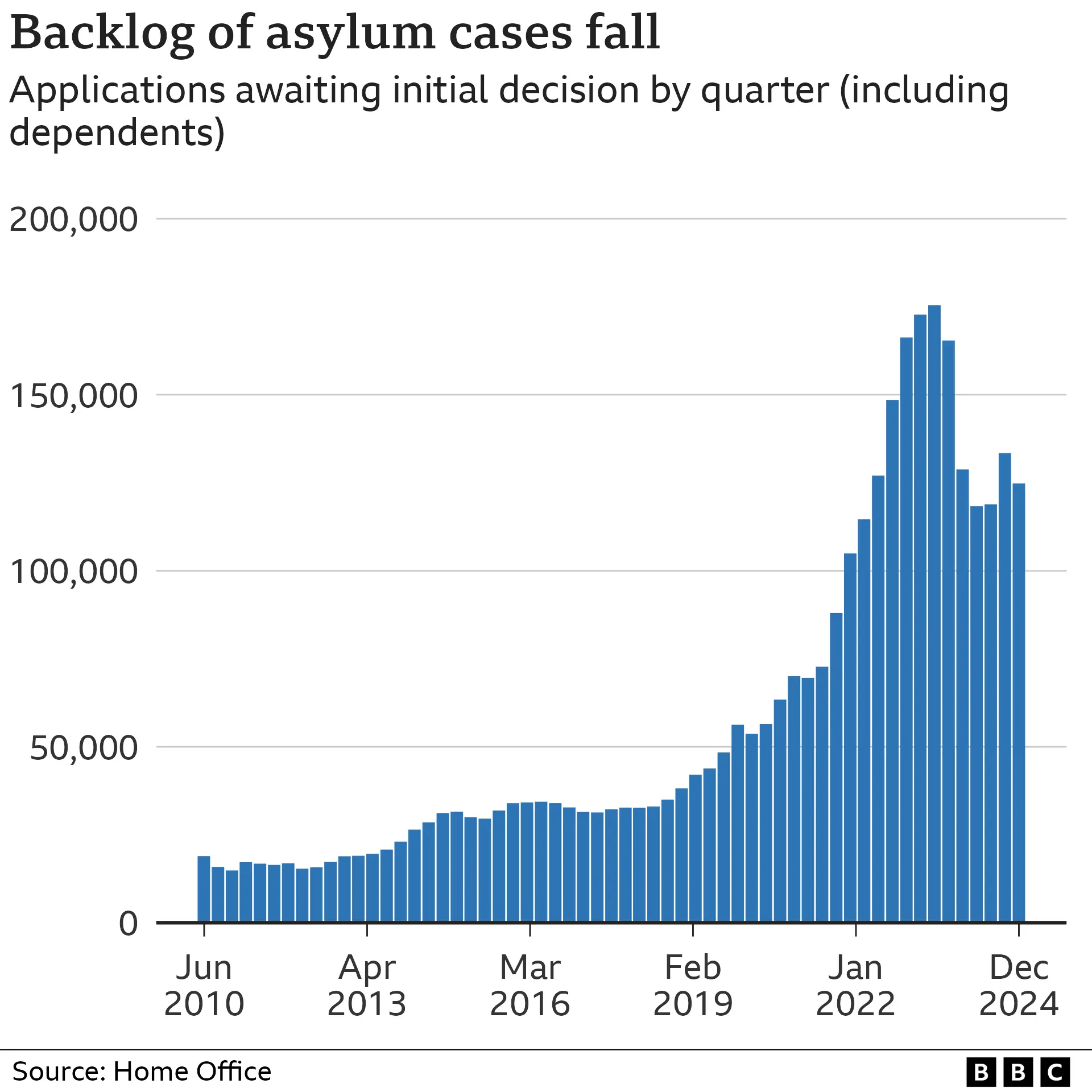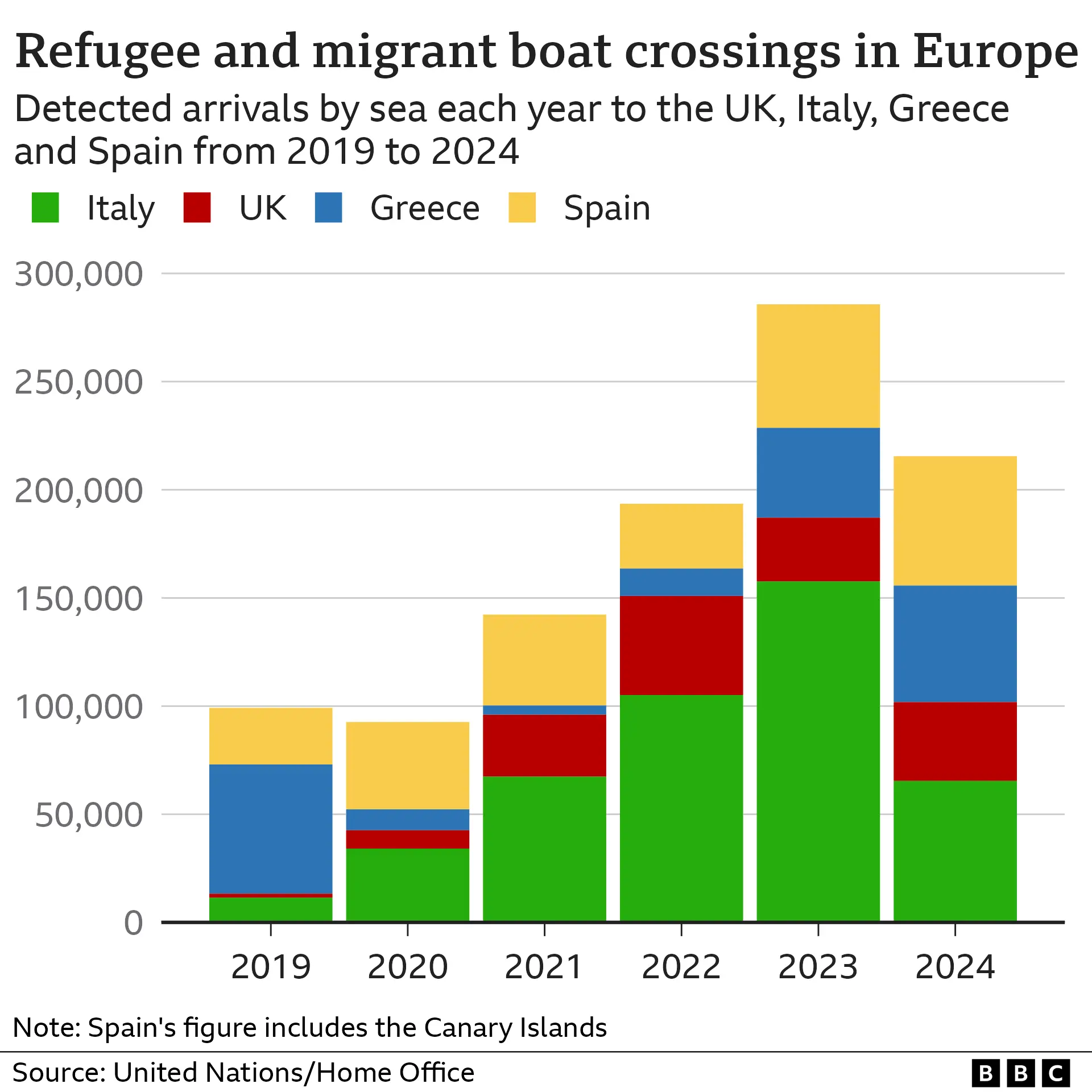How many people cross the Channel in small boats and how many claim asylum?
 Getty Images
Getty ImagesThe government has announced a series of measures to tackle people smuggling, including a new criminal offence of endangering the lives of others at sea.
Almost 37,000 people crossed the English Channel in small boats in 2024.
The number of people claiming asylum in the UK during the year to December 2024 was the highest since records began, in 1979.
How many people cross the Channel in small boats?
As at 26 February 2,056 people had crossed the Channel since the start of 2025.
In 2024 as a whole, 36,816 were detected making the crossing.
The highest figures were for 2022, when 45,755 people arrived.
Since 2018, when figures were first recorded, more than 150,000 people have arrived in small boats.

Of those who arrived in 2024, more than 23,000 did so after Labour won the July 2024 general election.
The Border Security, Asylum and Immigration Bill sets out Labour's plan to treat people smugglers like terrorists.
Suspects face travel bans, social-media blackouts and phone restrictions.
A new offence of endangering lives at sea will carry a jail term of up to five years.
And those convicted of acts in preparation for smuggling - such as buying boat parts - will face up to 14 years in prison.
Separately, the government has issued guidance saying anyone entering the UK by an irregular route - such as a small boat crossing - will normally be refused citizenship.
Previously, refugees who entered this way could apply for citizenship after 10 years.
The Refugee Council estimates at least 71,000 people will be affected.
How many people die crossing the Channel?
The International Organization for Migration (IOM), a UN agency, tracks the number of people who die attempting to cross the Channel.
The IOM estimates that at least 78 migrants died in 2024, making it the deadliest year on record. It says that at least 225 migrants have lost their lives attempting to cross since 2018.
Its figures include people who were travelling to a crossing point and died in other circumstances, such as car crashes or as a result of medical issues.
The Refugee Council said that government enforcement efforts have increased the dangers of crossings, with more people crammed into less seaworthy boats.
Who is crossing the Channel in small boats?
According to the latest Home Office figures, Afghans were the top nationality arriving by small boat in 2024.
Syrians made up the second largest group, followed by people from Iran, Vietnam and Eritrea.
These five nationalities accounted for 61% of all small-boat arrivals.

Albanians were the top nationality detected arriving by small boat in 2022, with 12,658 arrivals, but only 616 people came from the country in 2024.
How many people seek asylum in the UK?
More than 108,130 people claimed asylum in the UK in the year ending December 2024, the Home Office figures show, the highest number since records began, in 1979, an increase of 18% compared with 2023, and almost twice the number in 2021.
The previous peak, of 103,000 was recorded in 2002, as people fled conflicts in Afghanistan, Somalia and Iraq.

Claims fell sharply after 2002, dropping to a 20-year low of 22,600 in 2010.
But numbers rose again throughout the 2010s, as refugees fled Syria, and have risen again recently, after an increase in recorded small-boat arrivals.
And in 2024, almost one out of every three (32%) of those claiming asylum arrived via this route.
Where do UK asylum seekers come from?
In the year to December 2024, the largest number of asylum seekers came from Pakistan, with more than 10,500 applications.
A quarter of all applications came from people from Pakistan, Afghanistan (8,508) and Iran (8,099),
Ukrainian refugees who came to the UK after Russia's invasion of their country are not included in the figures.
As at 17 December 2024, 267,200 visas had been issued to Ukrainian refugees, who came through legal routes set up by the UK government.
There are also separate arrangements for a few other specific groups, such as some Afghan refugees and Hong Kong citizens.
The Home Office figures show 91% of the 7,800 refugees resettled in the UK in 2024 arrived through the Afghan Resettlement Programme.
How many asylum cases are waiting to be processed?
Some people wait months or even years for their claims to be considered.
At the end of December 2024, 90,686 cases relating to 124,802 people were awaiting an initial decision.
That is 5% fewer than were waiting at the end of 2023 - but the the number of outstanding cases is still higher than before 2022.

Former Conservative Prime Minister Rishi Sunak had pledged to clear older claims by the end of 2023.
But 4,500 "complex cases" were still awaiting a decision at the end of December that year and 1,428 remained unresolved at the end of December 2024.
How many asylum seekers does the UK send back?
The Home Office can remove people with no legal right to stay in the UK, or refuse to let them enter.
In the year to the end of December 2024,8,200 people who were not granted asylum were returned to their home country, an increase of 28% from 2023.
Albanians were the most common nationality for enforced returns in 2024 - 84%, compared with 87% of all returns in 2023.
Between 2018 and December 2024, 4,995 people who came to the UK in small boats were returned - about 3% of the total small-boat arrivals during the period.
How do UK small boat arrivals compare with those to Europe?
There were more than 180,000 arrivals by sea in Europe during 2024, with Italy receiving more than a third. Greece and Spain also received large numbers.
In 2023, there were 263,000 arrivals by sea in Europe.

How many people apply for asylum across Europe?
In the year ending September 2024, 1.11 million people claimed asylum in the European Union and European Economic Area, down 3% compared with the previous year.
Germany received the most applicants, 294,415 - more than a quarter of the total.
France was second (162,390) followed by Italy (162,305), Spain (161,470) and the UK (99,790).
